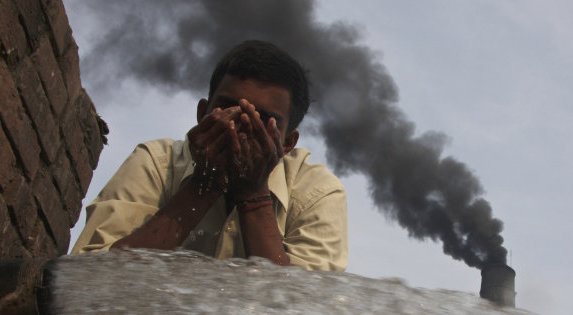This article of ours first appeared in Huffington Post on 17th July, 2017.
Nineteen of the G20 countries have affirmed their commitment to the Paris climate agreement, which sets guidelines for each participating country to mitigate global warming. Sponsored by the United Nations, it aims to slow the rise in global temperatures. The US is the lone outlier on climate change while India remains committed on the issue of climate change “as per its own values and requirements.”
On the face of it, climate change seems like a problem that may be happening but is still some time away in the future. So perhaps it can be handled sometime in the future. After all there are so many urgent problems facing our country—poverty, malnutrition, black money, terrorism, lack of infrastructure, etc. Plus, there is this diffused sense of responsibility because it’s affecting almost every country in the world. So the question arises, why should India take the lead to tackle climate change? After all it’s the developed countries that are responsible for much of the industrialisation that’s causing global warming and climate change. But what really matters is which countries are facing and will continue to face the maximum harm from climate change. And India is right on top of that list according to research by the Notre Dame Global Adaptation Initiative. The group measures vulnerability by considering the potential impact of climate change on six areas: food, water, health, ecosystem service, human habitat and infrastructure.
Climate change is a wicked problem. As this New Scientist article points out:
“It provides us with no defining qualities that would give it a clear identity: no deadlines, no geographic location, no single cause or solution and, critically, no obvious enemy. Our brains scan it for the usual cues that we use to process and evaluate information about the world, but find none. And so we impose our own.“
It is wide open for interpretation causing constant uncertainty. Climate scientists say people don’t get the science about the environment. Environmentalists say political will is being corrupted by vested commercial interests. Commercial interests deny climate change. Individual minds are left confused.
But not only do vested economic interests inhibit reforms, our individual brains are not geared to deal with the problem. Climate change is global, complex, somewhat abstract problem, and occurs in a time frame of decades, all of which make it difficult for people to respond appropriately. Costs are short term, benefits are long term and perceived as uncertain, though in fact benefits are massively greater than the costs of action now. Take survival, for instance. But people suffer from loss aversion—the tendency to fear losses more than we love gains. So it’s challenging for us to give up our aspirations to consume and enjoy the pleasures of consumption now, in order to reap the benefits of reversing climate change.
According to the National Oceanic and Atmospheric Association, US Department of Commerce, January 2017’s average global temperature was the third highest for January in the 1880-2017 record, behind 2016 (highest) and 2007 (second highest). The extent of polar sea ice on 4 December, 2016 was about 3.84 million square kilometers (1.48 million square miles) below the 1981-2010 average, according to U.S. National Snow and Ice Data Center satellite measurements. That’s roughly the size of India melted away because of rising global temperatures. The increase in temperature, heatwaves, storms, floods and disruption of weather patterns is being felt by everyone, but it’s still somehow not enough to get everyone to take the necessary desired action. Why?
To begin with, climate change is a soft term, moderate and fuzzy. It could do with re-labeling as “climate disaster”. Climate disaster creates a stronger sense of threat and generates a greater sense of urgency. It brings up vivid images to the mind of typical disasters—storms, floods, wildfires, droughts, etc. So people are more likely see it as harming them and their family, and more likely to see it happening now. Several behavioural science studies have shown evidence that when words are re-labeled it makes a huge difference in people’s behaviour. Imagine 3G, 4G and wifi being reworded as “radiation”.
However, education on “climate disaster” is not enough. It needs to be made more tangible for everyone to act upon it. We need to create behavioural design nudges in our everyday lives that enable everyone to effectively contribute in reducing climate disaster in a tangible, concrete way. For example, just like the Bureau of Energy Efficiency has created an energy saving star rating system for household appliances like air conditioners, refrigerators and washing machines, we need to have an encompassing “climate disaster” star rating system for each and every product and service we consume. Fewer the stars, more the damage caused to the planet. Higher the stars, the better it is for the planet. For example, amongst food items, chicken would get a higher star rating than beef because cows let out methane as they digest food, a potent greenhouse gas, 25 times as powerful as carbon dioxide. And beef requires 28 times more land to produce than chicken and 11 times more water. Vegetarian plant-based food would get the highest star rating in comparison. The “climate disaster” star rating system will, in turn, nudge manufacturers to ensure their products and services have a high star rating. That means relying on renewable sources of energy, efficient use of resources, efficient emissions and better waste management. Sure it can be complicated to work out such a rating for all products and services, but if done, we could have a shot at surviving ‘climate disaster’.
